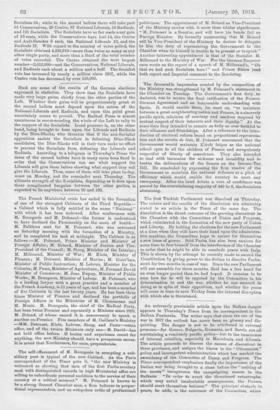The French Ministerial crisis has ended in the formation of
one of the strongest Cabinets of the Third Republic- a Cabinet which is fully entitled to the name " National " with which it has been endowed. After conferences with M. Bourgeois and M. Deleasse—the former is understood to have declined the Premiership on the score of health— M. Falliires sent for M. Poincara, who was entrusted on Saturday morning with the formation of a Ministry, and he completed his task at midnight. The Cabinet is as follows :—M. Poincar6, Primo Minister and Minister of Foreign Affairs ; M. Briand, Minister of Justice and Vice- President of the Council; M. Steeg, Minister of the Interior ; M. Millerand, Minister of War ; M. Klutz, Minister of Finance ; M. Deleasse, Minister of Marine; M. Guist'hau, Minister of Public Instruction; M. Lebrun, Minister for the Colonies; M. Pains, Minister of Agriculture; M. Fernand David Minister of Commerce; M. Jean Dupuy, Minister of Public Works ; M. Bourgeois, Minister of Labour. M. Poincare, who is a leading lawyer with a great practice and a member of the French Academy, is 51 years of age, and has been a member of five Cabinets in the last twenty years. He has been three times Minister of Finance and declined the portfolio of Foreign Affairs in the Ministries of M. Clemenceau and M. Monis. M. Bourgeois, the chief of the Radical Party, has been twice Premier and repeatedly a Minister since 1888. M. Briand, of whose record it is unnecessary to speak, is another ex-Premier. Five members of M. Caillaux's Ministry Deleasse, Klotz, Lebrun, Steeg, and Pams—retain office, and of the twelve Ministers only one—M. David—has not held office before. If brains and experience count for anything, the new Ministry should have a prosperous career. It is noted that Northerners, for once, preponderate.










































 Previous page
Previous page